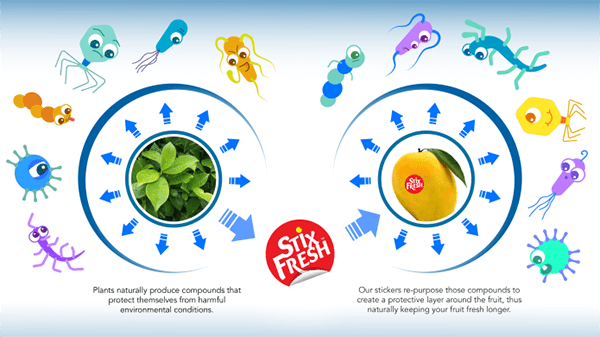(StixFresh image)
To what end will we go to extend shelf life?
Over the years I’ve been in this business, I’ve seen shelf life enhancers come and go. Ten years ago, I put myself through a grueling week testing Debbie Meyer Green Bags – anyone remember those from late night infomercials? I bought some from the “AS SEEN ON TV” aisle at Walmart.
(Spoiler alert: They work. But only if you open the bag and wipe condensation every day? So convenient.)
There’s a new magic bullet currently in the IndieGoGo fundraising stage: StixFresh.
The Washington-based company says their technology “can do more than just extend your fruits’ freshness by up to an incredible two weeks.”
Independent studies “also have shown that fruits treated with the StixFresh sticker show increased sweetness, higher retention of moisture, and sustained cellular structure resulting in increased firmness.”
“In essence,” they say, “your fruit will be more fruitful than ever.”
Groanworthy puns aside, if this technology works, it could be an interesting innovation for PLU-stickered produce.
The company’s crowdfunding has over a week left and has raised more than 280% of their initial goal, which is to sell consumers a $150 “year” supply of stickers (a roll including 365) they can apply to produce they bring home from the store.
The company says the technology is more effective the sooner you apply the stickers, so applying them in the packing, or even picking, process will guarantee maximum freshness.
We’ve come a long way, baby.
Back in my early days of produce journalism, Debbie Meyer bags were kind of a joke. I tried them, and they worked, but they weren’t practical at all.
Some of the newer technology we’ve seen come online not only has the science to back itself up, it’s scalable. We’re no longer changing weird little charcoal bags in a fridge. We’ve got Apeel Sciences-treated fruit at retailers nationwide.
Hazel Technologies is all over my inbox.
We have Food Freshness Cards for our refrigerators. I still haven’t figured this wizardry out, but I did see that Natures Natural Solutions received the 2019 Gold Edison Award in Food Tech Solutions.
The cards extend shelf life 40% for many fruits, vegetables and breads, according to a news release, and are useful through storage, transportation, grocery, restaurants and home applications.
I particularly like the home application part. Consumers need all the help they can get in realizing they need to step up and do their part. Contrary to what we see all the time about the food chain, the home is where we see the majority of food wasted.
Consumers have proven they are eager for solutions to make their produce last longer, and the benefits extend into retail. Technology that not only enhances shelf life but maintains optimal flavor can only help us in the long run.
Jury’s still out on the magic stickers, though. I may have to pledge some cash to the IndieGoGo to try them myself.
To what end will we go to extend shelf life?
Over the years I’ve been in this business, I’ve seen shelf life enhancers come and go. Ten years ago, I put myself through a grueling week testing Debbie Meyer Green Bags – anyone remember those from late night infomercials? I bought some from the “AS SEEN ON TV” aisle at Walmart.
(Spoiler alert: They work. But only if you open the bag and wipe condensation every day? So convenient.)
There’s a new magic bullet currently in the IndieGoGo fundraising stage: StixFresh.
The Washington-based company says their technology “can do more than just extend your fruits’ freshness by up to an incredible two weeks.”
Independent studies “also have shown that fruits treated with the StixFresh sticker show increased sweetness, higher retention of moisture, and sustained cellular structure resulting in increased firmness.”
“In essence,” they say, “your fruit will be more fruitful than ever.”
Groanworthy puns aside, if this technology works, it could be an interesting innovation for PLU-stickered produce.
The company’s crowdfunding has over a week left and has raised more than 280% of their initial goal, which is to sell consumers a $150 “year” supply of stickers (a roll including 365) they can apply to produce they bring home from the store.
The company says the technology is more effective the sooner you apply the stickers, so applying them in the packing, or even picking, process will guarantee maximum freshness.
We’ve come a long way, baby.
Back in my early days of produce journalism, Debbie Meyer bags were kind of a joke. I tried them, and they worked, but they weren’t practical at all.
Some of the newer technology we’ve seen come online not only has the science to back itself up, it’s scalable. We’re no longer changing weird little charcoal bags in a fridge. We’ve got Apeel Sciences-treated fruit at retailers nationwide.
Hazel Technologies is all over my inbox.
We have Food Freshness Cards for our refrigerators. I still haven’t figured this wizardry out, but I did see that Natures Natural Solutions received the 2019 Gold Edison Award in Food Tech Solutions.
The cards extend shelf life 40% for many fruits, vegetables and breads, according to a news release, and are useful through storage, transportation, grocery, restaurants and home applications.
I particularly like the home application part. Consumers need all the help they can get in realizing they need to step up and do their part. Contrary to what we see all the time about the food chain, the home is where we see the majority of food wasted.
Consumers have proven they are eager for solutions to make their produce last longer, and the benefits extend into retail. Technology that not only enhances shelf life but maintains optimal flavor can only help us in the long run.
Jury’s still out on the magic stickers, though. I may have to pledge some cash to the IndieGoGo to try them myself.
Pamela Riemenschneider is the Retail Editor and resident gadget guinea pig for Blue Book Services.



